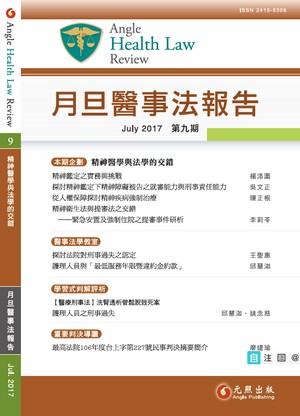精神衛生法與提審法之交錯──緊急安置及強制住院之提審事件研析【本期企劃】 試閱
Interactions of the Mental Health Act and the Habeas Corpus Act: A Research Study on Habeas Corpus in Cases of Emergency Placement and Mandatory Hospitalization
本研究係從司法院法學檢索系統下載自提審法施行後,即2014年7月至2017年3月間,地方法院上傳之一審聲請提審裁定,針對依精神衛生法緊急安置或停止住院之提審聲請實務,以及法院裁定駁回之理由,進行統計分析,就駁回裁定理由提出問題,並指出與法院現行實務不一致之程序問題,特別是抗告法院之管轄法院,應有統一之見解。另就政大搖搖哥事件所生遍及全臺地方法院,數十件由不同之第三人以同一書狀聲請同一提審事件,徒生法院不必要之負擔,建議就提審法第三人聲請資格,應有合理之限制,俾節省司法資源。
This article is a statistical analysis, based on district court decisions of habeas corpus petitions in cases of emergency placement or mandatory hospitalization, according to the Mental Health Act, between July 2014 and March 2017. It analyzes and questions the reasons provided in court decisions which deny habeas corpus. This research finds that judicial practices are not consistent with each other, including jurisdiction of the courts of appeals which require consistent opinions. In addition, dozens of petitions for habeas corpus of the same case in different courts throughout Taiwan, that were caused by the affairs of Mr. Tin in Taipei, should be limited, within reason, with the qualification of a third party, in order to limit the strain on judicature resources.
044-061






